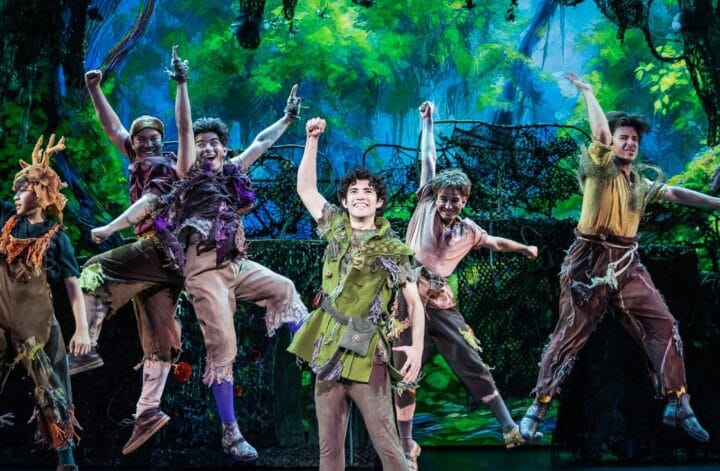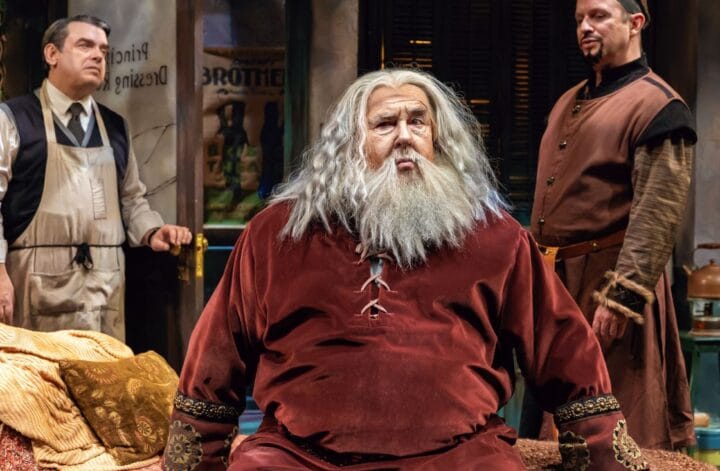Fantasy Theater Factory celebrated Father’s Day this year with a collection of twelve monologues, entitled Dear Dad, which premiered online on June 20th and will remain available for free streaming on their Facebook page throughout the next month.
Though the sentimental title may suggest a feel-good festival, what you will actually find if you tune in is a downbeat hour and fifteen minutes dominated by characters’ explanations of the many ways that their fathers have failed. This dark realization becomes apparent early on with the first monologue called “Wonderful Wonderful Wonderful,” which explores how the main characters’ relationship with her father has been fractured by his disinterest in her.
The monologues only get drearier from there. Next up is “The Father, The Son” by Cris Eli Black, in which a son confronts his father over his lifelong absence, while later pieces “The Magician” and “My Russian Father” focus on the emotional absence of the respective fathers’ at issue. In “The Alarm Sounds,” by Pamela Reingold Mayer, a woman attempts to reason with her deadbeat partner by comparing him to her own more honorable dad. Then, actress, Emelia Drogo, makes the best of a rather forgettable script while trying to get through to her alcoholic father in “Where Is Daddy” by Joanie Anton.
Next, there was “Watch Out For Me” by John Cappelletti, perhaps the darkest offering of the lot, in which we watch a character played by Timothy Mark Davis confront the priestly “father” who destroyed his innocence as a child. Although disturbing, it is also one of the more engaging pieces, perhaps because it is one of the few in which something actually happens besides complaining. That “something” happens to be—spoiler alert— murder.
Thanks to Elizabeth Price, one of four directors who were responsible for three monologues each, “Watch Out For Me” also manages to make the most interesting use of the nondescript space the pieces were filmed in. For instance, Davis gets up and moves towards the camera (to go stab someone), sways neurotically while clinging to a chair back, and makes an eerie sign of the cross near the piece’s end. One must also marvel at his facility with dialogue that is at times so explicit it must’ve been difficult to say with a straight face, let alone with the striking intensity that Davis maintains throughout.
Yet quite a lot of the other characters on offer can only be found sitting or standing statically while they unburden their patriarchal woes. The inherent sparsity of the monologue makes it a challenging form to master at the best of times, and the visual and narrative stagnancy this production imposes on them does it no favors. Maybe this should be somewhat excused given the difficulty of producing “theatre” at all in a world beset by COVID-19.
But the pandemic can’t be blamed for some baffling production choices that were unrelated to the way that the show was presented, like the decision to include not one but two monologues focusing on sexual abuse by clergymen and the selection of monologues that were not only inordinately depressing given the occasion but often, frankly, not terribly well-written.
The cast of Dear Dad Monologue Festival.
Dear Dad’s performers, though, do a respectable job with the mostly mediocre material, most reaching the realm of the commendable. Davis, Laurie Tanner, and Osvaldo Quintana all spiced things up by imbuing their characters with accents that added a bit of variety to the proceedings, and Paolo Pineda’s earnestly sweet delivery of “Next Time” by Nina Ki almost overshadowed the monologue’s cliché content.
But you wouldn’t be totally disappointed if you came to Dear Dad seeking some Father’s Day cheer, as a minority of the pieces do focus on somewhat healthier parent-child relationships. For instance, in the closing monologue “A Man of Few Words” by Nancy Rose Ostinato, a daughter reflects on how her imperfect, but loving relationship with her adoptive father shaped the woman she would go on to become.
And in a fitting holiday twist, two of the strongest pieces in the lineup are those that focus on characters who are dads rather than their aggrieved children. A monologue from the play Be Still Be Silent by Daniel Tobias, a father reflects on the sacrifices he has made for his autistic daughter, brings some much appreciated humanity to the dismal proceedings.
Then, in “A Letter to My Unborn Son” by Devin Porter, which I found to be the most moving and best-constructed monologue of the bunch, a black father-to-be winningly played by Randall Swinton addresses his son-to-come in, at first, a light comedic tone. But the timely piece then poignantly pivots to grapple with its speaker’s fear of the dangers that this son may face as he comes of age in our unjust world.
So if you aren’t afraid of dredging up your own daddy issues, you might just want to give Dear Dad a chance. After all, you’ll find it only a click away!
The playwrights of Dear Dad Monologue Festival.


